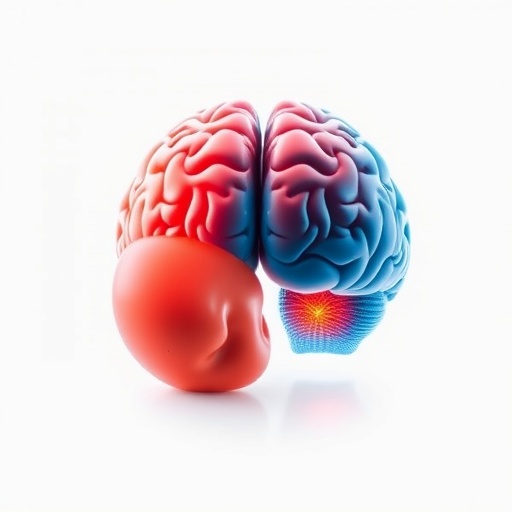In an intriguing study that has the potential to reshape our understanding of the intricate relationship between body fat and brain function, researchers led by Baranova, Fu, and Zhao have unveiled compelling evidence supporting the existence of a “fat-brain axis.” This burgeoning field of research investigates how the phenotypes of body fat and brain health influence each other. Their findings, published in the Journal of Translational Medicine, emphasize the complex interplay between adiposity and neurobiology, and the implications could be far-reaching for both mental and physical health.
Researchers have long recognized that body fat is not merely a passive storage mechanism for energy. Instead, adipose tissue is a dynamic endocrine organ that secretes a plethora of bioactive compounds, commonly referred to as adipokines. These substances influence various physiological processes, including inflammation, metabolism, and even neurological function. Through rigorous examination, the study articulates how these adipokines can modulate neuronal pathways, affecting behaviors, cognition, and mood.
The study meticulously investigates the pathways through which body fat can affect brain phenotypes. One prominent finding suggests that increased adiposity leads to greater production of inflammatory cytokines, which can contribute to neuroinflammation—a condition often associated with cognitive decline and mental health disorders. The authors present compelling evidence that this inflammatory response can create a vicious cycle, further exacerbating issues related to obesity and brain health.
Interestingly, the research also highlights how the brain can, in turn, influence body fat distribution and metabolism. Neural circuits, particularly those within the hypothalamus, play a critical role in the regulation of appetite, energy expenditure, and fat storage. By modulating these neural pathways, the brain has the potential to affect how the body handles fat, thus creating an intricate feedback loop. The findings suggest that interventions targeting brain function might be effective strategies for managing obesity and related conditions.
As the study unfolds, the researchers delve into specific neurobiological mechanisms that mediate the relationship between fat and the brain. For example, they discuss the role of the endocannabinoid system, which is heavily involved in appetite regulation and energy balance. Dysregulation within this system has been linked to obesity and anxiety disorders, underscoring the potential for cross-talk between metabolic and emotional domains.
The implications of the fat-brain axis extend beyond understanding obesity and mental health issues. The researchers propose that these insights could also inform therapeutic approaches for neurodegenerative diseases such as Alzheimer’s. Given the documented associations between obesity and increased risk of cognitive decline, interventions aimed at modulating fat metabolism may offer novel pathways for prevention and treatment.
Furthermore, the research calls for a shift in how health professionals view obesity. Rather than perceiving it solely as a result of lifestyle choices, the study advocates for recognizing it as a complex interplay of biological, psychological, and neurological factors. This comprehensive perspective could lead to more effective public health strategies that address the root causes of obesity.
The study elucidates the importance of maintaining a healthy weight not just for physical well-being but for cognitive integrity as well. As obesity rates continue to surge worldwide, the findings acquire an urgency that cannot be ignored. The potential for a spiraling effect—in which overweight individuals face increased cognitive issues, leading to sedentary behaviors that further exacerbate their condition—poses a significant public health challenge.
As the authors note, interventions at multiple levels—from individual lifestyle changes to broader public policy initiatives—are crucial for addressing the obesity epidemic. Education around the connection between body fat and brain health could empower individuals to make more informed decisions to improve both their mental and physical well-being.
Moreover, the study encourages future research to explore the impact of various diets and lifestyle modifications on both adiposity and cognitive function. For instance, the Mediterranean diet, known for its neuroprotective properties, could be examined for its effects on the fat-brain axis. Such inquiries not only promise to elucidate the mechanisms involved but also guide individuals toward dietary choices that promote long-term health.
In conclusion, the revelation of a fat-brain axis marks a pivotal moment in our understanding of obesity and cardiovascular health. The intricate relations between body fat and brain phenotypes warrant further exploration, as they hold vital clues to preventing and managing obesity, mental health disorders, and neurodegenerative diseases. Researchers are now challenged to dig deeper, unveil the mysteries of the fat-brain relationship, and leverage these insights for future interventions and treatment strategies, with the hope of unlocking a healthier future for all.
The ramifications of this research transcend academic boundaries. By prioritizing an integrative approach to health that considers both the brain and body as interconnected systems, society can foster a culture that effectively combats the rising tide of obesity and its associated consequences.
Ultimately, the work of Baranova and colleagues serves as a reminder of the profound impacts our lifestyle choices have on our overall health, reinforcing the importance of holistic wellness in the face of an increasingly sedentary and obesity-prone society. Their research stands as a call to action for clinicians, researchers, and public health policymakers alike to embrace a broader perspective on health—one that values the delicate web of interactions between our bodies and brains.
Subject of Research: The interplay between body fat and brain function, termed the “fat-brain axis.”
Article Title: Fat-brain axis indicated by mutual impacts between body fat and brain phenotypes.
Article References: Baranova, A., Fu, L., Zhao, Q. et al. Fat-brain axis indicated by mutual impacts between body fat and brain phenotypes.
J Transl Med (2025). https://doi.org/10.1186/s12967-025-07453-8
Image Credits: AI Generated
DOI: 10.1186/s12967-025-07453-8
Keywords: fat-brain axis, obesity, neuroinflammation, cognitive decline, adipokines, metabolic health, preventive strategies.




